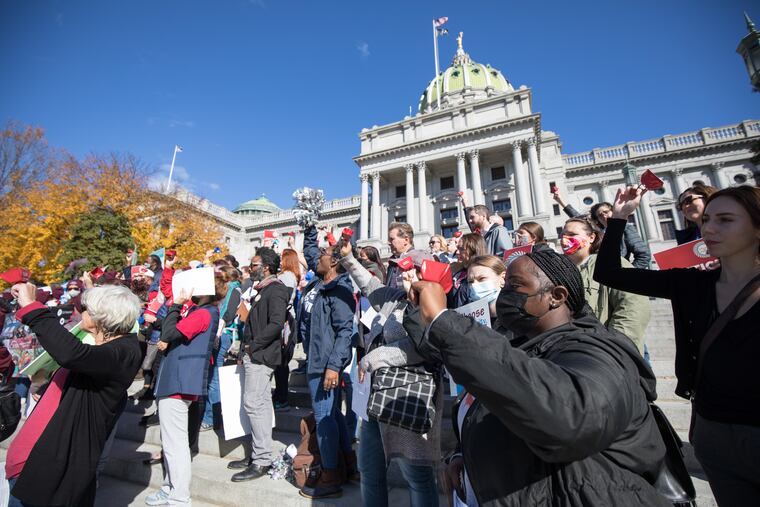Schoolhouse crumbling? That’s what you deserve, the Pa. GOP says. | Opinion
Pennsylvania’s failure to address long-standing school funding inequities shows that the state believes that students deserve only the education their families can afford.

In the ongoing school funding lawsuit now before Pennsylvania Commonwealth Court, the plaintiffs — a coalition of legal advocates, parents, school districts, and education advocates — argue that the state government has failed to provide funding necessary to ensure a “thorough and efficient system of public education,” as required by the state constitution. In support of their case, they have called nearly 30 witnesses, including leaders of school districts large and small from every corner of the state, as well as students and others harmed by what they say is a major underfunding of the commonwealth’s schools — to the tune of $4.6 billion, according to one witness for the plaintiffs.
Their witnesses have painted a stark, grim, and very real case. The grossly inequitable funding of our state’s public schools means that while some students take classes in veritable palaces of education, others are forced to attend school in buildings that are hazardous to their health. While some districts are flush with the resources to support students amidst a pandemic as well as they have been able to serve them in regular times, some districts testified to their experience enduring massive shortfalls in staffing, technology, and student supports.
In case you’re unsure if this is unusual, it is. Compared with other states, Pennsylvania has one of the worst spending gaps between rich and poor school districts.
» READ MORE: 5 takeaways from Pennsylvania’s ongoing, landmark school-funding trial after one month
Predictably, the outflow of all of this inequity is massively divergent student outcomes. Disparities in graduation rates, student achievement, and life outcomes are as stark as the gaps in funding between schools.
The defense, led primarily by the Republican-led state legislature, has begun to call witnesses and make its case. We don’t need to look hard to see how they’ll respond to this overwhelming case.
Their argument will likely be simple: Some students deserve less.
Don’t take my word for it. John Krill, the attorney for the Republican Senate president pro tempore, said it plainly when questioning a plaintiff’s witness. Like a deadbeat parent making their case at a child support hearing, Mr. Krill told the court those kids don’t really need the money.
“What use would a carpenter have for biology?” Krill asked. “What use would someone on the McDonald’s career track have for Algebra 1?” he continued. “There’s a need for retail workers, for people who know how to flip a pizza crust.”
So there you have it. We’re giving schools and their students what our legislators deem they deserve. Schoolhouse crumbling? That’s what you deserve. Overcrowded classes with zero support for teachers? That’s all you’re worth. Dated curriculum and limited class selection? That’s all you’re capable of comprehending anyway!
How we fund schools sends a powerful message to the students and educators who learn and teach in them. So when we hear about achievement gaps and staff shortages, we need to first recognize that we have resourced these schools to get exactly the outcomes that they produce. Pennsylvania’s failure to address long-standing school funding inequities shows that the state believes that students only deserve the education their families can afford.
“How we fund schools sends a powerful message to the students and educators that learn and teach in them.”
Is it any wonder that students in our least-resourced schools are more likely to be disengaged, fall behind, and even drop out? Is it any wonder then that we have teachers fleeing the profession for careers in … well, anything else? Again, we have a school funding system that is perfectly designed for the results it gets. None of this should be a surprise, but it should be an outrage.
At the Center for Black Educator Development, the organization I lead, our goal is to build a sustainable and highly effective Black teacher pipeline by getting more Black teachers into classrooms, equip them with the skills they need to be excellent teachers, and provide them with the faculties required to persevere through what is an incredibly challenging but rewarding career. But all of that work is for naught if the conditions of teaching and learning in schools are willfully degraded and shortchanged by state leaders.
State Democrats have put forward a $3.75 billion education plan that would put a heavy emphasis on funding equity, educator recruitment and retention, bolstering classroom resources, and expanding mental health supports in schools. Those are all worthy investments.
But do our students, as the attorney for Senate Republicans contends, deserve no better than crumbling buildings and anemic academic resources? Do our teachers deserve toxic work environments and a dearth of professional supports? We’ll have to wait to see if a state court judge sees fit to provide the obvious answers to those questions.
Sharif El-Mekki is the CEO of the Center for Black Educator Development. He is a contributor to Philly’s “7th Ward” blog and a cohost of the “8 Black Hands” podcast.